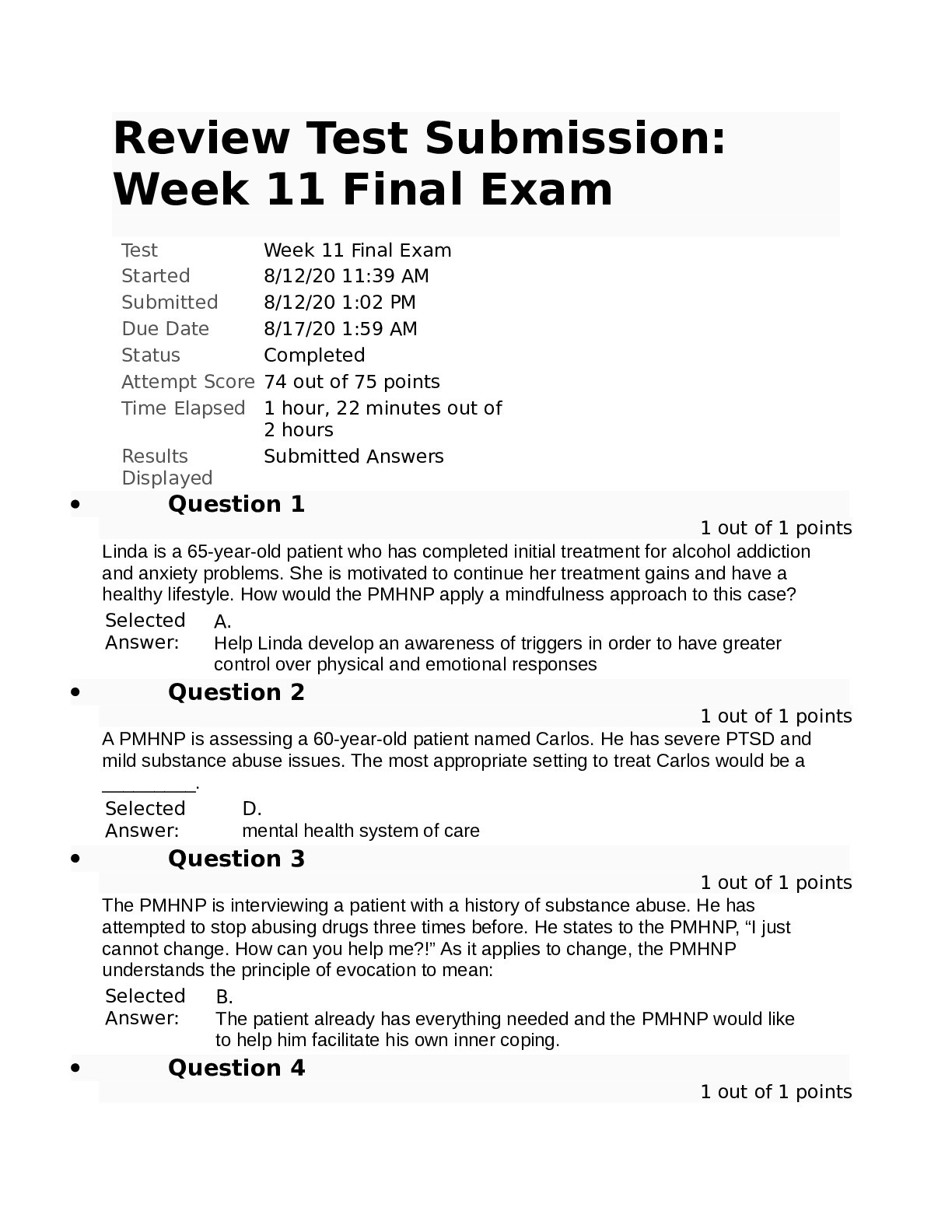Question 1
1 out of 1 points
Linda is a 65-year-old patient who has completed initial treatment for alcohol addiction
and anxiety problems. She is motivated to continue her treatment gains and have a
healthy lifestyle. How would the PMHNP apply a mindfulness approach to this case?
Question 2
1 out of 1 points
A PMHNP is assessing a 60-year-old patient named Carlos. He has severe PTSD
...[Show More]
Question 1
1 out of 1 points
Linda is a 65-year-old patient who has completed initial treatment for alcohol addiction
and anxiety problems. She is motivated to continue her treatment gains and have a
healthy lifestyle. How would the PMHNP apply a mindfulness approach to this case?
Question 2
1 out of 1 points
A PMHNP is assessing a 60-year-old patient named Carlos. He has severe PTSD and
mild substance abuse issues. The most appropriate setting to treat Carlos would be a
_________.
Question 3
1 out of 1 points
The PMHNP is interviewing a patient with a history of substance abuse. He has
attempted to stop abusing drugs three times before. He states to the PMHNP, “I just
cannot change. How can you help me?!” As it applies to change, the PMHNP
understands the principle of evocation to mean:
Question 4
1 out of 1 points
The PMHNP is assessing a 30-year-old client who reports feeling stressed out due to
his current employment situation. When asked about how he manages this workrelated
stress, the patient says that exercise helps him feel less anxious, so he often
spends 2 or more hours at the gym each night. After completing the patient
assessment, the PMHNP has determined that an existential psychotherapy approach
may best benefit this client. What is the PMHNP’s goal in employing this treatment
approach?
Question 5
1 out of 1 points
The PMHNP initiates feeling-state therapy to help a 25-year-old patient named
Monique who has a compulsive urge to exercise. Using the Feeling-State Addiction
Protocol, what is an appropriate next step the PMHNP should take after identifying the
specific positive feeling linked with the addictive behavior and its Positive Feeling
Score level?
Question 6
1 out of 1 points
The PMHNP uses the Adult Attachment Interview (AAI) with a male patient who
reports having had a difficult time being separated from his parents during his
childhood. He explains that going to school or visiting his relatives without his parents
was troublesome. The PMHNP characterizes the patient as unresolved/disorganized,
according to his outcomes on the AAI. What does the PMHNP anticipate from the
patient?
Question 7
0 out of 1 points
A PMHNP is using motivational interviewing (MI) with a 50-year-old patient named
Dave to commit to a healthy drug-free lifestyle. By using “change talk,” the PMHNP
hopes to help the patient build self-esteem and hope.
True or false: If Dave is resisting change, the PMHNP should challenge his resistance
in order for MI to be successful.
Question 8
1 out of 1 points
A PMHNP is using emotion-focused therapy to help a 38-year-old patient who says,
“I’ve been feeling angry lately, but I’m not sure why.” The first attempt by the PMHNP
is to say:
Question 9
1 out of 1 points
The PMHNP is actively listening to Ms. Thomas who is detoxing from alcohol. Ms.
Thomas is currently discussing with the PMHNP the reasons why she feels guilty
about her drinking. Ms. Thomas tearfully states, “I have driven my family and friends
away with this terrible habit. I have no one left. I had more than enough chances and
now my children won’t even talk to me.” Which of the following statements
demonstrate a simple reflection?
Question 10
1 out of 1 points
The PMHNP is caring for a geriatric patient who expresses symptoms of
gastrointestinal problems, aches and pains, and loss of appetite. The patient reports
feeling lonely, as more of his friends have been passing away over the recent months
and years. The PMHNP focuses on which therapeutic approach for this patient?
[Show Less]
